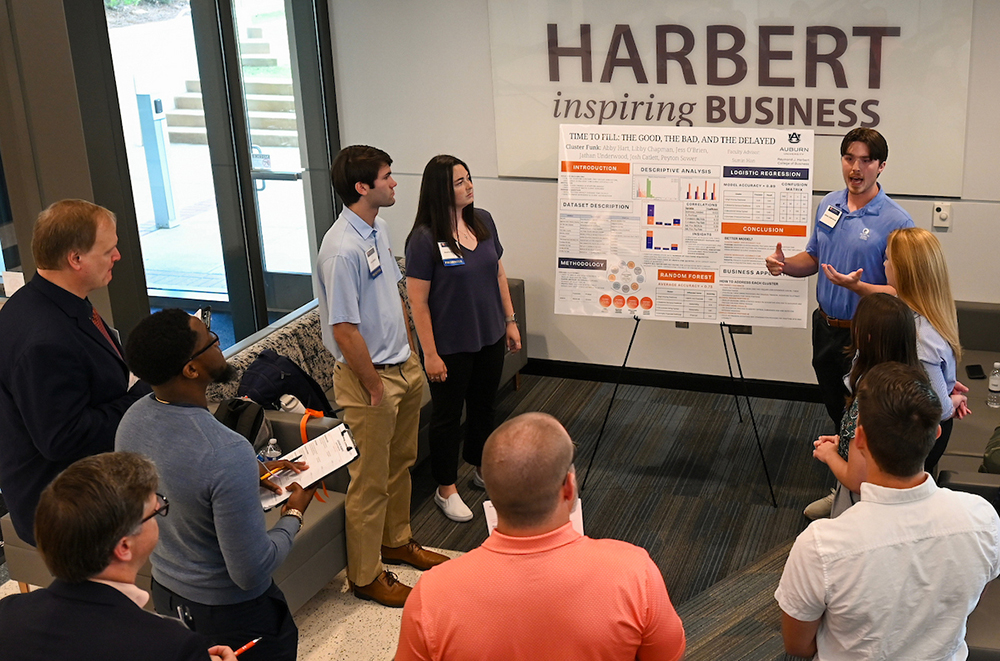 |
stock.adobe.com/fauzan-ai-gamification-image
|
Do you want to play a game? Auburn University researcher Yifan Zhang says businesses
that realize the value of gamification to attract customers, motivate employees and
improve data collection are making a smart move when they look to game-like approaches
for greater appeal.
Zhang is an assistant professor in Auburn’s Harbert College of Business Department of Business Analytics and Information Systems, and his research work on gamification recently was accepted for publication in Information Systems Research, a highly respected peer-reviewed journal that seeks to publish the best research
in the information systems discipline.
His work looks at overcoming speed bumps for gamification to make it more successful
and useful, such as improving poor designs through better collection and wiser use
of data.
Who uses it?
“Gamification is using game-design elements in non-game contexts to make them more
engaging. In other words, gamification makes non-game tasks feel more like playing
a game, which encourages people to participate, stay motivated and complete goals,”
Zhang said.
The rewards of using gamification correctly already are evident, he said. “It is certainly
an important aspect of many business operations, which are expected to reach a $96.8
billion market by 2030.”
He cited several examples of successful gamification use:
- Education:Apps like Duolingo use streaks, levels and rewards to encourage language learning.
- Marketing:Brands use loyalty points and rewards to encourage repeat purchases.
- Workplace:Companies use gamified platforms to boost employee training and productivity.
- Fitness:Apps like Fitbit award badges for reaching step goals or completing challenges.
The diverse spectrum of fields that could benefit from gamification continues to widen,
he said.
Using data the right way
Research and proper testing matter when it comes to using the concept for successful
results, Zhang’s work shows.
“Despite the many success stories of gamification, a significant number of applications
fail due to poor design,” he said. “In business, a common approach to improving platform
design is A/B testing, a method where different versions of a platform are randomly
assigned to users, and the version that yields better business outcomes is selected.
“However, conducting A/B testing on gamified platforms can be particularly challenging.”
He used coffeehouse mega-chain Starbucks as a business model to consider.
“Imagine Starbucks wants to modify its loyalty program by reducing the number of stars
required to earn a reward,” Zhang said. “If this change is applied only to a subset
of customers even for only a small period of time, it could lead to widespread dissatisfaction
and backlash on social media, as customers perceive the program as unfair or inconsistent.”
His team’s research looked at providing a new approach for gamification systems by
better analyzing the user-level data.
The research thus offers managers a new approach to considering alternative gamification
designs.
Bottom line, says Zhang:
“This method can help uncover valuable insights about user behavior and their responsiveness
to different gamification elements, ultimately supporting more informed and effective
design decisions.”
Recognition worth celebrating
Uzma Raja, Benoski Chair and the Business Analytics & Information Systems department chair
in the Harbert College of Business, shared praise for Zhang’s work and its reflection
on Auburn.
“Yifan’s research contributes to three key areas: the literature on gamification,
the practical design and implementation of gamification systems, and the methodological
advancement of causal inference methods,” she said.
Information Systems Research journal “is the universally recognized top journal in the Information Systems discipline,”
Raja said. “Having Yifan's work published there not only reflects the caliber of our
scholars but also highlights the Harbert College of Business’s commitment to advancing
impactful research."
“Auburn provides unparalleled support to its faculty, helping elevate both research
standards and productivity, which in turn enhances the university’s visibility on
a global stage.”
Uzma Raja, chair of the Department of Business Analytics and Information Systems
Publications in such journals are milestones worth celebrating, Raja said.
“They reflect the dedication, persistence, and scholarly excellence of our faculty.
These accomplishments are the result of years of hard work, supported by the resources
and collaborative environment at Harbert College,” she said. “We are proud to see
our faculty targeting and succeeding in the world’s most prestigious scholarly outlets,
further enhancing Auburn University’s global reputation.”
From China to Auburn
Zhang joined the Auburn faculty at Harbert College of Business in June 2024.
“I’m originally from China,” he said. “I began my doctoral studies at Penn State University
and, after graduation, spent a few years working at Kennesaw State University. What
drew me to Auburn the most was the people.”
It didn’t take long for him to understand what people mean when they refer to the
Auburn Family.
“My colleagues here are incredibly friendly, the students are polite and a joy to
work with, and the strong alumni support and their deep love for Auburn truly stood
out to me,” he said.
Meanwhile, his career path had its own personal attraction.
“Growing up, I always had a passion for numbers and data,” Zhang said. “After completing
my undergraduate degree in mathematics, I wanted to pursue a career that was both
applied-driven and involved advanced statistical modeling.
“Quantitative marketing, which analyzes consumer behavior through consumer data, became
a natural fit for my interests and aspirations.”
Zhang’s work on the gamification research included co-authors Lei Wang from Indiana
University and Yi-Jen (Ian) Ho from Tulane University. Their article, “Game for brainstorm: The impact of a badge system on knowledge sharing,” was published online in Information Systems Research on July 28, 2025.
“Publishing in Information Systems Research has certainly been a milestone in my academic career. I’m deeply grateful for the
support of my coauthors, my college, and Auburn University,” Zhang said. “This achievement
wouldn’t have been possible without them.
“I look forward to applying what I’ve learned throughout this publication process
to develop more impactful research for top business journals in the future.”
###
Learn more about Business Analytics and Information Systems in the Harbert College
of Business.

 Degrees & Programs
Degrees & Programs
 Faculty & Staff
Faculty & Staff
 Career Development
Career Development
 Recruiters & Industry
Recruiters & Industry



